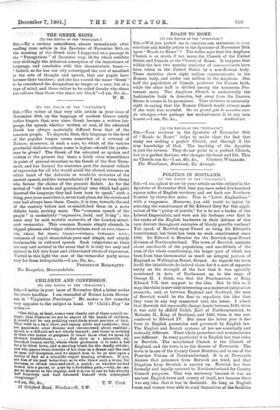[To THE EDITOR OF THE "SPECTATOR:1 Sin,The writer of that
very able article in your issue of November 30th on the language of modern Greece surely rather forgets that, ever since Greek became a written lan- guage, the speech, whether written or oral, of the educated Greek has always materially differed from that of the common people. To degrade; then, this language to the level of the popular tongue seems somewhat of a reversal of Nature; moreover, in such a case, to which of the:various provincial dialects—whose name is legion—should the prefer- ence be given? The Greek--of the educated as spoken and written at- the present day bears a fairly close resemblance in point of general structure to the Greek of the New Testa- ment, and has formed for centuries past the natural vehicle of expression for all who would avoid the absurd extremes on either hand of the Atticists or would-be restorers of the ancient speech; and the vernaCularists (if I may so term them) who favour the claims of the peasant dialect. As for the ieviál Of 13-ad -10Vid.4 and grainiriatic-al had quite deserted the language they had been born . to speak," such thing,pace your contributor, never took place, for the words and uses had always- been there. Corals, it is true, towards the end of the century before last re-establislied them on a more definite basis, nothing more, The "common speech of the peoile" is iindenlably-"expressive, lucid, and living" ; the same may be said, Matatis mutandis, of the London street- arab vernacular. This common Romaic simply abounds in clipped- phrases and vulgar abbreviations, such as XfrE, 44419—
Eii,utv, • for AirrE, Alyspw—inroivrfc,. 1:+v/4o/cm instances of rapid enunciation pure and simple, and utterly- inadmissible in cultured speech. Such vulgarisms as these are easy and natural in the sense that it is only too easy and natural to fall into loose and abbreviated tricks of expression. Viewed in this light the case of the vernacular party seems very far from indisputable.—I am, Sir, &c.,






























































 Previous page
Previous page